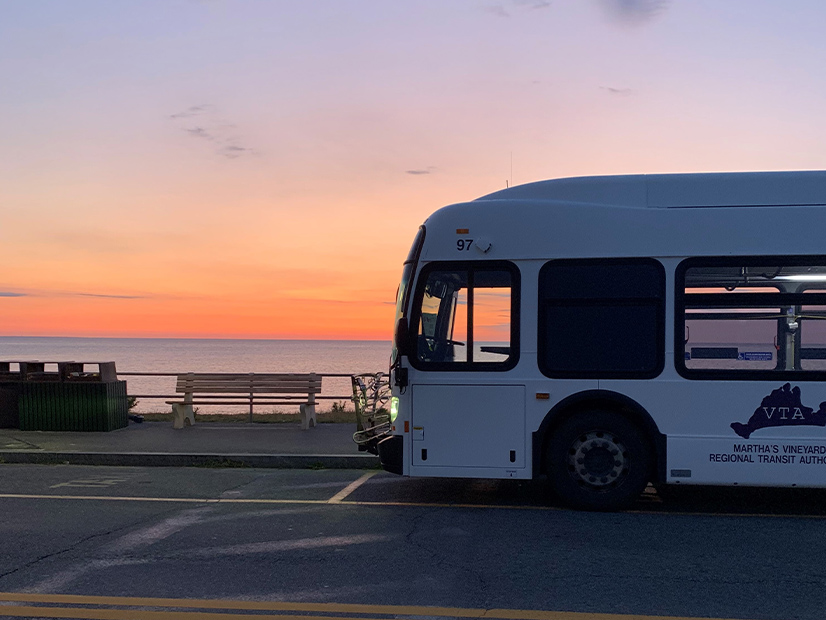
Battery storage is a key part of the 10-year plan to transition the Martha’s Vineyard Transit Authority (VTA) bus fleet to electricity, but the Federal Transit Administration’s Buy America requirements and industry growth pains have been a challenge on that journey.
VTA has 1,400 kWh of utility-scale battery storage at its operations center as part of a microgrid that enables grid-parallel and grid-independent battery-electric bus (BEB) charging, according to Administrator Angela Gompert.
The authority awarded NEC subsidiary NEC Energy Solutions, based in Westborough, Mass., a contract in 2018 for the storage units. The batteries, however, did not meet the Buy America requirement under the FTA’s guidelines for purchases made with federal assistance, Gompert said on Tuesday during a Green Energy Consumers Alliance webinar.
Under the Buy America Act, a state or local government authority can only use federal assistance on transportation projects if their steel, iron or manufactured goods are produced in the U.S.
“Currently, there are no battery storage vendors that meet the Buy America requirements,” Gompert said. To purchase the batteries, she added, VTA diverted some state funding to the project.
Gompert believes manufacturers need to catch up to the realities of the current U.S. market.
“If there’s a battery vendor that really gets up-to-speed quickly with what the existing requirements are for using federal funds for transit agencies, certainly they’ll get a lot further,” she said.
In 2020, NEC ES announced it was backing out of the storage market, and LG Energy Solution acquired the subsidiary last fall.
Gompert says the change in the vendor’s circumstances created a “huge nightmare” that VTA is still working through. NEC ES, however, continues to support the three storage units, she said.
Three storage units “strengthen” transit operations, providing flexibility, resilience and the ability to store renewable energy generated on site. To support the transition of its 32-bus fleet from diesel to electric, the authority also installed eight solar canopies with 700 kW of generating capacity at its operations center.
“We have seen demand response savings from using the battery storage units, and they increase the distribution of our overall efficiency when charging all of the fleet at the same time,” she said.
As a component of the microgrid, storage makes grid-independent charging possible. The microgrid decides whether charging will be grid-to-bus, grid-to-battery, solar-to-battery or solar-to-bus, and if necessary, buses can charge from a backup diesel generator, Gompert said.
Other Challenges
VTA has replaced 16 of its diesel buses with BEBs manufactured by Los Angeles-based BYD, and there is one charger for each bus.
“Our operations maintenance center is fully ready to complete the buildout for all chargers for all our vehicles,” Gompert said. “Our next phase will be putting in some Level 3 charging as we expand into fleet replacement with our paratransit vans and minibuses.”
Malvern, Pa.-based Momentum Dynamics won a contract to install inductive (i.e., wireless), in-road charging pads along VTA’s bus routes, and construction is underway on the first pad site in Edgartown, she said. All the BEBs currently in service have charging pad retrofits for using the wireless charger.
The technical aspects of transitioning to BEBs and building the systems to support them have been a “heavy lift” for the authority because of the organization’s comparatively small size, Gompert said. VTA procured its BEBs, chargers, batteries, microgrid components and solar facilities under separate contracts and managed development and integration of the elements individually.
New energy-as-a-service models, Gompert said, could help other transit authorities with their BEB programs.
“Coordination of the partners and the system components is done as part of [energy-as-a-service] agreements,” she said.
Component software and hardware updates also present a challenge for the organization. If those updates are not well coordinated, the systems “can get out of sync,” which becomes “problematic,” Gompert said.


